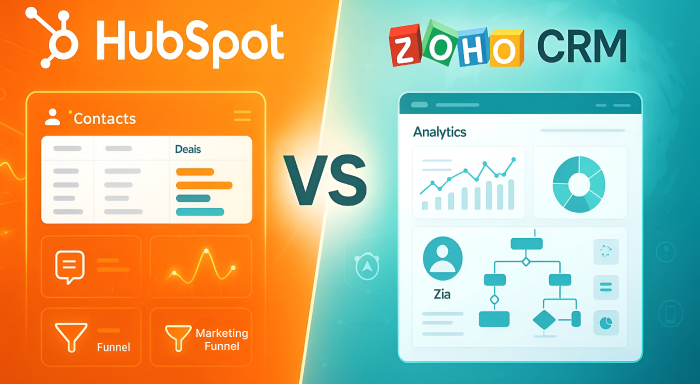There are a few more prevalent names in business than HubSpot. This might primarily be because of its vast range of features. One of the finest offerings of HubSpot is its effective customer relationship management tool. It entails the industry’s most advanced tools for handling customer relationships. However, as you know, the pricing plans of the platform exist on the higher side. This higher-range pricing plan has prompted SMEs to look for more feasible alternatives such as Zoho. However, is the choice only dependent on the size of your organization? Let us try to answer in this comprehensive HubSpot vs Zoho comparison guide.
Before we get to the detailed comparison section, let us understand a few basic points first-
Does HubSpot Offer a Free Plan?
Now, since you know that HubSpot is an expensive tool, the question you might ask is does it offer a free plan? The answer is yes. However, there is a caveat here: without the presence of advanced selling and marketing characteristics, you will struggle to generate expected leads and fall short of your desired conversion rate. Experts consider HubSpot Sales hub to be a close alternative to Zoho CRM, but its feature range is more limited.
ZohoCRM Is a Lot More Comprehensive Offering
With versatile sales automation, flexible customization options, and robust intelligence and analytics, Zoho has all the capabilities you require to transform your business and take it to the next level. By comparison, HubSpot only provides standard features related to customer relationship management. A few experts do not even consider HubSpot to be a full-fledged CRM solution.
HubSpot Vs Zoho CRM: A Comprehensive Comparison Guide
HubSpot has all the features a basic CRM needs to have: a company, contact, and deal management. Along with that, it also contains email integrations, live chat, and website visitor monitoring. It can be a viable option if you have a large sales team because its free plan ensures accessibility to unlimited users.
However, as your business scales, you will find the need for specific vital characteristics such as workflows, automation, forecasting, and custom reporting. The basic pricing plan for HubSpot Sales Hub starts at $50/month, offering accessibility for two users. Zoho Enterprise pricing comes at a similar price. It is not just about the cost, either. Zoho can turn out to be a more viable solution in all aspects. Yet, a few businesses still opt for HubSpot. The exact choice depends a lot on the requirements.
Let us understand the HubSpot Vs Zoho comparison via a table.
HubSpot CRM vs Zoho CRM: Feature Comparison Table (2026)
| Category | HubSpot CRM | Zoho CRM |
| Core CRM Features | Company, deal, and contact management as well as live chat and activity monitoring. | Complete CRM features: Marketing, sales, service, automation, inventory, and AI. |
| Sales Automation | Standard automation is available only in paid plans such as Professional+. | Workflow automation via free plans; custom functionalities and macros included. |
| Process Management | There are no custom escalations or validations. It is limited only to the pipeline stages. | It provides custom validations, blueprints, and journey orchestration. |
| Customization | Limitations in terms of modifications possible to user-interface. There are custom modules, but they are available only in the Enterprise plan. | Extensive range of customization: fields, modules, views, and sandbox for testing. |
| Analytics & Reports | Customizable reports available in Professional+ plan only; limited accessibility to mobile | Sophisticated analytics available across various mobile plans. There is also a mobile analytics application. |
| AI Capabilities | Basic Artificial Intelligence (business card scan, deduplication, and call transcripts. | AI assistant “Zia” provides email intelligence, image scanning, and forecasting. |
| Marketing Automation | Separate Marketing Hub; contact-driven pricing | In-built segmentation, lead scoring, and attribution in CRM. |
| Collaboration | Standard meeting scheduling and tagging. | CalDAV synchronization, built-in feeds, and portals for partners and vendors. |
| Inventory Management | Product quotes and library | Full suite: invoices, quotes, vendors, and management of orders. |
| Mobile Features | Task management, chat, and CRM record accessibility. | Route mapping, voice notes, AI assistant, and accessibility to full analytics. |
| Support & Onboarding | Phone (Professional+), Email (paid only), and paid consulting. | Comprehensive support across various plans; implementation cost is included in the plans. |
| Developer Tools | Only RestAPI | Widgets, RESTAPI, web/mobile SDKs, and serverless code support. |
| Pricing (Billed Annually) | Expensive on the higher side with pricing plan beginning at $50/month for 2 users (Starter). | Begins at only $14 per user and per month. (Standard) |
| Best For | Small teams who want to integrate free CRM solution; simple pipelines. | Growing businesses requiring scalability, depth, and flexibility in processes. |
A Promising Alternative: OutRightCRM for Growing Businesses
While HubSpot and Zoho are still the most preferable solutions in the CRM industry, OutRightCRM has quickly gained traction as a specialized solution for organizations looking for scalable, affordable, and innovative solutions. Especially recommendable for SMEs, this comprehensive CRM integrates modern capabilities and user-friendly design that simplify internal workflows and customer engagement.
Purpose-built with flexibility and customization as its core principle, it can easily adapt to suit unique business requirements without confusing users with complex interfaces.
Contrary to premium platforms, the platform is more affordable and does not have a steep learning curve initially. So, for SMEs who are looking for straightforward solutions at an economical price, OutRightCRM is the best option.
CRM Requirements Difference Across Diverse Marketplaces
While comparing HubSpot vs Zoho, it is imperative to consider the regional regulations and preferences that can greatly impact the CRM adoption. In regions such as the Canada and United States, businesses generally go for HubSpot because of its easy integration support with widely known marketing solutions and robust inbound marketing suite. However, in European nations and Australia, where cost-efficiency and GDPR compliance are the main priorities, Zoho CRM is vastly popular for its powerful security characteristics and reduced cost of ownership. Choosing between the tools ultimately depends on your budget, marketing objectives, and customization goals.
Pro Tip: Don’t just look at the initial cost and the immediate investment. Think of CRM as something beyond contact management and data storage. Understand the lasting advantages in terms of productivity, decision-making, and conversions. CRM-driven insights can completely turnaround position in the market.
Conclusion
The HubSpot vs Zoho comparison shows clear distinction in terms of priorities—HubSpot provides simplicity with strong integration support to marketing platforms while Zoho ensures greater flexibility, depth, and affordability. For growing businesses and SMEs, Zoho generally proves to be a preferable solution because of its affordable pricing and extensive range of characteristics. However, the right choice boils down to your region, business size, and specific requirements. Don’t just look at the pricing plan—consider the long-term automation, scalability, and insights for best ROI.



